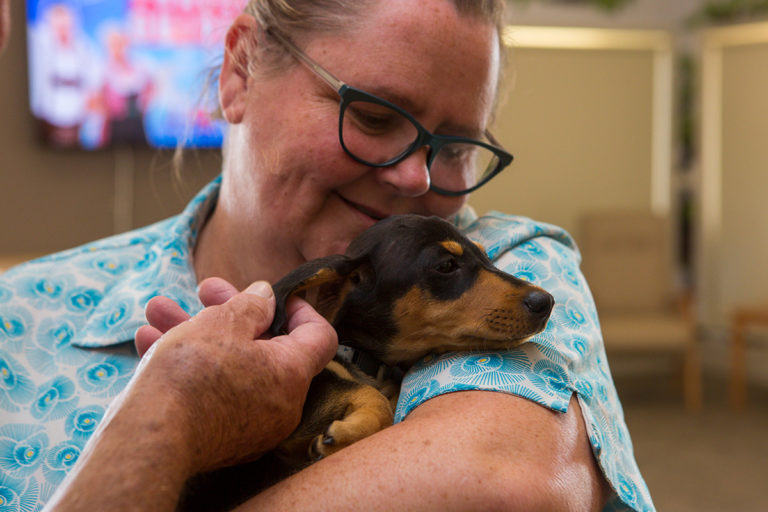Pet therapy in aged care: what you need to know
You’ve most likely heard the saying “dogs are a man’s best friend,” but dogs and other pets alike can often do much more for a person’s health than just being a great companion.

You’ve most likely heard the saying “dogs are a man’s best friend,” but dogs and other pets alike can often do much more for a person’s health than just being a great companion. Aged care centres, retirement villages and hospitals can benefit from regular visits from animals trained to offer support and companionship to people in an unfamiliar or stressful environment through pet therapy.
1.What is pet therapy?
Pet therapy, also known as Animal Assisted Therapy (AAT), is a treatment aimed at improving an individual’s overall health and wellbeing through consistent interaction with an animal. Pet therapy benefits both children and adults and has been proven to elevate mood and decrease loneliness.
The first formal research into pet therapy began in the 1960s and it has become an increasingly popular form of treatment for people with disabilities, mental illness, chronic diseases, dementia and people living in aged care centres or in hospital.
Pet therapy is an umbrella term that encompasses a range of activities and programs. These could include anything from informal play dates with minimal supervision to psychological treatments suggested by and supervised by a professional.
Depending on the needs of the individual, pet therapy may involve adopting an animal, taking part in a community therapy animal program, or participating in sessions at an aged care centre. Animal interaction can promote a sense of belonging, love and appreciation and can be a great source of companionship for individuals feeling isolated.
Discover how art is used as therapy in aged care
2.What are the benefits of pet therapy?
Pet therapy provides a wide range of benefits to patients both physically and mentally. According to a study published in the Japanese Psychogeriatric Journal, pet therapy improved depressive symptoms in residents in a long-term facility by 50%. Participants also experienced an overall improved self-perceived quality of life.
Another study concluded that all participants with dementia experienced a significant increase in pro-social behaviour and a decrease in behavioural disturbances during the interaction with the dog.
Pets also play an important role in helping individuals recover from loss. Elderly people who have recently lost a spouse or family member can greatly benefit from the companionship of an animal, as it can provide comfort during times of grief.
According to different studies, pet therapy can help people physically, mentally and emotionally. These are important for people living with dementia and aged care centre residents. Some of these benefits include:
- decreasing the risk of cardiovascular disease by increasing exercise
- improving fine motor skills
- improving strength and balance
- improving independent movement
- reducing the risk of heart attack or stroke
- increasing willingness to join activities and exercise.
- reduced symptoms of depression, post-traumatic stress disorder and anxiety
- increased self-esteem and self-worth
- reduced feeling of loneliness and isolation
- improved interpersonal and communication skills
- elevated sense of purpose
- improved interactions with others.

Discover the benefits of music therapy in aged care
3.Pet therapy for people with dementia
For people living with dementia, pet therapy can reduce common feelings of loneliness, depression, anxiety and confusion. Regular visits from animals can assist in alleviating some of the anger, frustration and helplessness experienced by people with dementia.
In addition to a surge in positive emotions, one of the biggest benefits is mental stimulation, which some studies have shown can have a positive impact on memory recall. Some individuals have been shown to recount chronological events with increased ease and become more relaxed as oxytocin, prolactin and serotonin are released.
A study conducted in Germany involving therapy dogs found that residents living with dementia had improved verbal communication function and greater attentiveness after completing the program. The group who had spent time with the animals reported feeling “interested,” “enthusiastic” and “inspired” significantly more than those who did not spend time with the pets.
4. Pet therapy in aged care
A number of IRT’s aged care centres across NSW, South East Queensland and the ACT receive regular visits from animals to help improve mood and decrease stress.
For example, the Shoalhaven Zoo makes frequent visits to some of the surrounding IRT aged care centres to show off the local animals to residents.
Visits can consist of a one-hour mixed animal show or a two-hour farmyard display. Residents are introduced to a mix of animals including, crocodiles, lizards, goats, rabbits and chickens.
The trained dogs and volunteers at Paws Pet Therapy also make regular visits to a number of IRT aged care centres, with some residents receiving visits up to three times a month.
Shoalhaven-based Lifestyle Team Leader Sharon Matthews says residents really enjoy the visits from the animals. “The residents absolutely love it, some residents will cry with joy when the animals come in. Depending on their needs, residents can receive more frequent visits.”
5.What types of animals are used?
With pet therapy becoming more popular, the types of animals included in the programs have become more diverse. Some of the most popular animals used for pet therapy include:
Dogs
The most common therapy animals that visit aged care centres and hospitals are dogs. Dogs come in a variety of shapes and sizes, making them great for almost anyone. Dogs are naturally a great companion for humans and can provide comfort and friendship to those feeling lonely.
Horses
A much larger alternative to dogs, horses make great therapy animals. Horses are great animals to aid in mental health and are also used in addiction treatment centres and veterans groups. Horses help people build trust and improve their work ethic, in addition to helping them deal with emotions.
Cats
Cats make great therapy animals for aged care residents who once owned a cat themselves. They are a good option for indoor facilities to aid in comforting those who may be missing their pet back home.
Robotic pets
Robotic pets are another option for those seeking comfort from a pet. Robotic pets can be a great alternative to their furry friend counterpart as they don’t need walks, food or vet visits.
Professor Wendy Moyle from Griffith University is a partner in the Dementia Collaborative Research Centre, where the focus of her work is on the impact of social engagement and quality of life for people with dementia, families and carers. She develops and evaluates assistive technologies and social robots and has been a part of a number of clinical trials into the use of robots for people with dementia.
“Assistive robots can provide physical care and social support. They can also provide reminders about appointments, medications and dietary requirements and can alert individuals to the risk of a fall or dehydration. Importantly, they do not arrive with any ‘social baggage’, which can impede care, and they do not judge people.”
Does your loved one need support?
IRT has been supporting older Australians and their families with compassionate care for more than 50 years with aged care centres in NSW, Qld and the ACT. If your loved one needs warm and personalised care you can trust, we'd be more than happy to help.
Subscribe to our newsletter
You may also like
Here's what happens if you neglect your physical health
Staying fit can be hard sometimes, but we've got plenty of simple tips to help keep you active.
Seven Questions for Kellie Marshall
Kellie Marshall is a Senior Clinical Psychologist and the newest member of the IRT Group Board.


